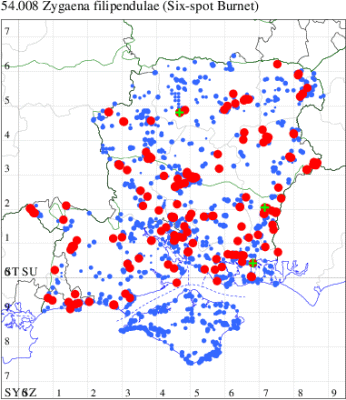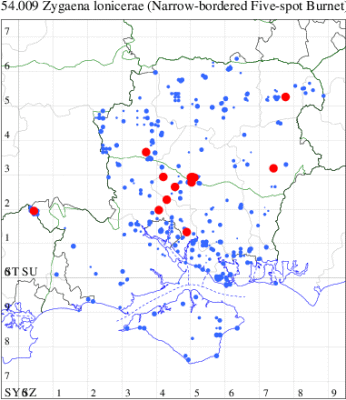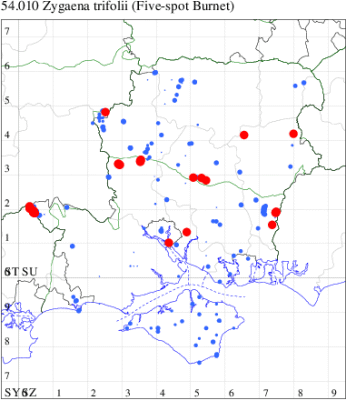2023 Annual Report for: Zygaenidae / Zygaeninae
For species seen in 2023 that had less than or equal to 100 records, full details are included; for more common species, the earliest, latest and highest count by vice-county are shown. The narrative for each species is taken from the main Hantsmoths website, and it is possible that some information on abundance and occurrence can get out of date, as it is impossible to keep up with all changes; however it should give a good introduction to each species. The tables in each species account summarise the previous status, and that for the current year.
For the maps, all records prior to 2023 are shown by a blue dot (the larger the dot, the more recent), with the current year's records shown in red. As previous records are superimposed on any report for 2023, new sites have greater emphasis (i.e. will show as 'more red').
In the species accounts, an asterisk next to a location indicates a new 10km square record; earliest ever dates are highlighted in orange, and latest ever in red. Initials in the species accounts refer to the recorders listed here. Please get in touch if you identify any omissions or errors, in particular if you have records that have yet to be submitted. Details of how to submit records can be found here.
54.008 [B&F: 0169] Six-spot Burnet Zygaena filipendulae (Linnaeus, 1758) - Common
Common on flower meadows, roadside verges, downland, woodland rides and sand-dunes throughout the British Isles, predominantly coastal in the north of its range. In Hampshire and on the Isle of Wight by far the commonest and most widely distributed burnet moth, about four times more numerous than the second most frequent burnet moth, Narrow-bordered Five-spot Burnet Z. lonicerae. Wingspan 25-39 mm. Day-flying. Unmistakable — no other British species of burnet moth has six spots. Larva feeds on Bird's-foot Trefoil and Horseshoe Vetch, over-wintering at least once.
Records prior to 2023
| Vice County | #Records | #Individuals | First Record | Last Record |
|---|---|---|---|---|
| 10 | 735 | 4958 | 1849 | 2022 |
| 11 | 1994 | 10329 | 1951 | 2022 |
| 12 | 1314 | 7840 | 1951 | 2022 |
2023 records
| Vice County | #Records | #Individuals | Max Quantity |
|---|---|---|---|
| 11 | 147 | 413 | 43 |
| 12 | 91 | 269 | 35 |

Records by year
Records by week (adult)
Records by week (larval)
Record Summary
VC11: Earliest: Butser Hill, 07 May, 20 (NBur) Latest: Portsdown Hill, 12 Sep, 1 (NBur) Max count: Coulters Dean, Buriton, 07 Jun, 43 (LHou)
VC12: Earliest: Magdalen Hill Down NNR, 22 May, 2 (DSte) Latest: Basingstoke, 09 Aug, 1 (PEH) Max count: Magdalen Hill Down NR, 18 Jul, 35 (AJB)
54.009 [B&F: 0171] Narrow-bordered Five-spot Burnet Zygaena lonicerae (Scheven, 1777) - Ireland only
Subspecies latomarginata common on grassland, chalk downland and sea cliffs throughout much of England (but largely absent from the south-west) and southern Wales. In Hampshire and on the Isle of Wight far more common and widespread than the Five-spot Burnet, and colonies of 'five-spot burnets' encountered off the chalk are more than likely to be this species. Subspecies insularis restricted to northern Ireland. Subspecies jocelynae (Talisker Burnet) restricted to Skye, where it is protected under the UK Wildlife and Countryside Act, and a priority species under the UK Biodiversity Action Plan. Wingspan 22-40 mm. The differences between this species and Five-spot Burnet are comparative and slight, but in lonicerae forewing is longer and more pointed, leading corner of hindwing is more pointed and black border of hindwing is narrower, but a number of specimens of each may be needed in order to see these differences. Larva feeds on Meadow Vetchling, Red Clover, Sainfoin, Greater Bird's-foot Trefoil, White Clover and Bitter Vetchling.
Records prior to 2023
| Vice County | #Records | #Individuals | First Record | Last Record |
|---|---|---|---|---|
| 10 | 25 | 121 | 1973 | 2022 |
| 11 | 398 | 2558 | 1951 | 2022 |
| 12 | 442 | 2417 | 1951 | 2022 |
2023 records
| Vice County | #Records | #Individuals | Max Quantity |
|---|---|---|---|
| 11 | 9 | 14 | 4 |
| 12 | 7 | 8 | 2 |

Records by year
Records by week (adult)
Records by week (larval)
Record Details
VC11: Zionshill Cottage, one, field observation, 15 Jun (AJB); Wildern LNR, Hedge End, one, field observation, 06 Jun; two, field observation, 11 Jun (TCrw); Pitt Down (East), four, field observation, 25 Jun (AJB, LB); Hocombe Mead, one, field observation, 18 Jun (AJB); Yew Hill NR, one, field observation, 26 Jun (SMcL); Chilcomb Ranges, two, field observation, 09 Jun (AJB); Magdalen Hill Down NR, one, field observation, 26 May (TDCh);
VC12: Leckford, one, field observation, 22 Jun (GCE); Magdalen Hill Down NNR, one, field observation, 10 Jun; one, field observation, 10 Jun; Magdalen Hill Down NR, two, field observation, 10 Jun (AJB); two, field observation, 27 May (AJB, LB); Noar Hill HIWWT NR, present, field observation, 13 Jun (iNat); Tundry Pond, one, field observation, 13 Jun (KBW)
54.010 [B&F: 0170] Five-spot Burnet Zygaena trifolii (Esper, 1783) - Local
Local on grassland and heathland, and by freshwater margins, throughout much of southern England and Wales. In Hampshire not as widespread as in the past, but still locally present, generally on the chalk, and relatively frequent on the Isle of Wight. Wingspan 24-37 mm. Day-flying. Very difficult to distinguish from the much more widespread Narrow-bordered Five-spot Burnet Z. lonicerae, even using features of genitalia: however, the habitat, time of year and location may help; slightly smaller than Narrow-bordered; examples with the middle pair of spots merged are frequent in Five-spot Burnet, but rare in Narrow-bordered (MBGBI Vol 2). It is very difficult to make a determination based on one individual from photos. Larva feeds on Greater Bird's-foot Trefoil.
Records prior to 2023
| Vice County | #Records | #Individuals | First Record | Last Record |
|---|---|---|---|---|
| 10 | 27 | 23 | 1929 | 2019 |
| 11 | 96 | 528 | 1945 | 2022 |
| 12 | 81 | 375 | 1940 | 2022 |
2023 records
| Vice County | #Records | #Individuals | Max Quantity |
|---|---|---|---|
| 11 | 24 | 233 | 52 |
| 12 | 6 | 15 | 10 |

Records by year
Records by week (adult)
Records by week (larval)
Record Details
VC11: Broughton Down HIWWT NR, two, field observation, 14 Jun; five, field observation, 14 Jun; one, field observation, 14 Jun; three, field observation, 14 Jun (BRob); Marsh Court, Stockbridge*, three, field observation, 07 Jun; four, field observation, 19 Jun; one, field observation, 27 Jun; two, field observation, 02 Jul; one, field observation, 19 Jun; Common Marsh, Stockbridge*, one, field observation, 31 May; five, field observation, 07 Jun; 10, field observation, 12 Jun; seven, field observation, 19 Jun; one, field observation, 12 Jun (RJac); Weston Shore, Southampton, one, field observation, 17 Jun (NBur); Wildern LNR, Hedge End, one, field observation, 17 Jun (ABinn det. DGar); Chalton Down, Chalton, 20, field observation, 19 Jun (DAS); Coulters Dean, Buriton, 37, field observation, 14 Jun; 23, field observation, 14 Jun (LHou); seven, field observation, 30 May (FHay); 52, field observation, 14 Jun (LHou); four, field observation, 30 May (FHay); present, field observation, 04 Jun (CBel); 42, field observation, 14 Jun (LHou);
VC12: Tidworth, one, field observation, 09 Jun (JMoo); Magdalen Hill Down NNR, 10, field observation, 03 Jun (JWale); Matterley Estate, one, field observation, 11 Jun; one, field observation, 10 Jun (MJW); Home Farm Wood, Burkham*, present, field observation, 08 Jun (JTC det. MJW); Blacknest, Binstead*, two, field observation, 06 Jun (SWom)
